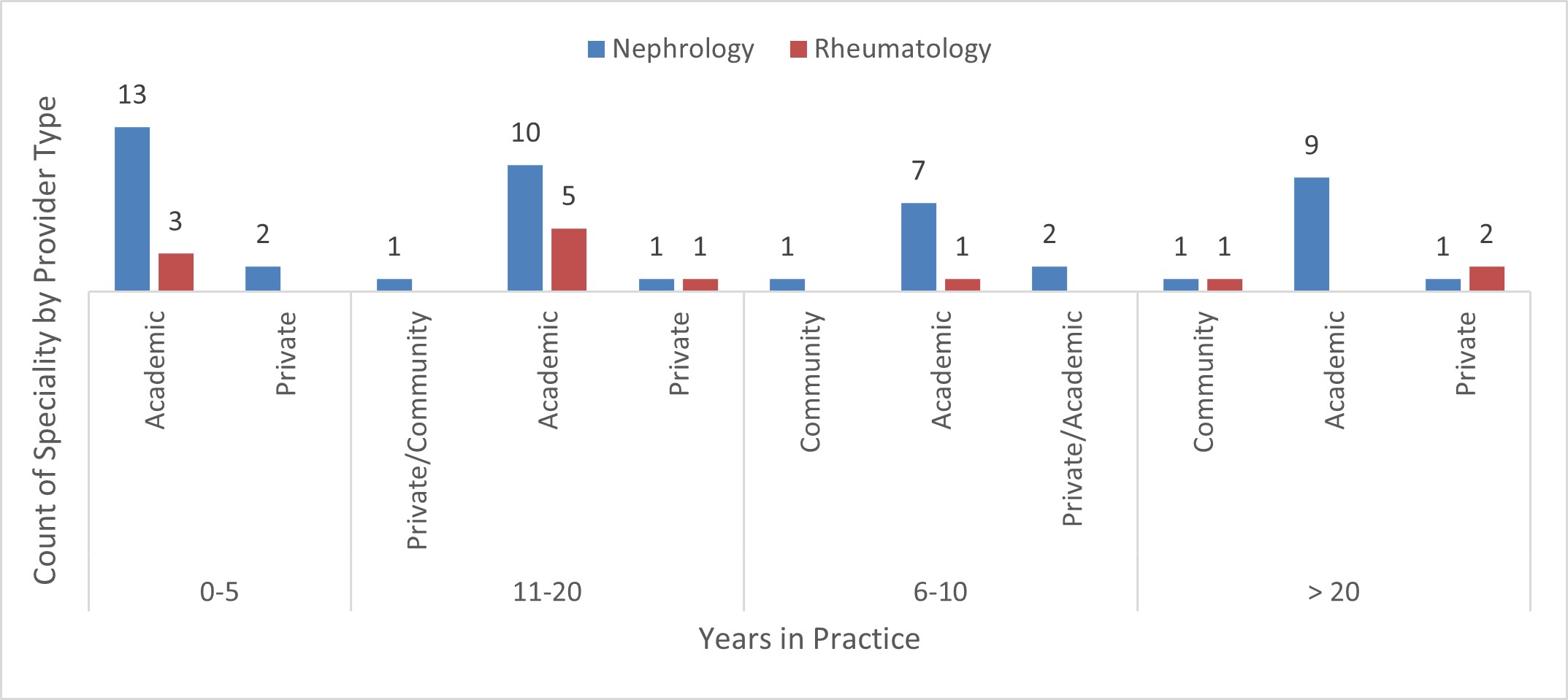Session Information
Session Type: Poster Session C
Session Time: 10:30AM-12:30PM
Background/Purpose: Although uncontrolled gout (UG) is an inflammatory arthritis triggered by crystallization of monosodium urate within joints following hyperuricemia, increasing evidence supports its classification as a systemic disorder with significant renal implications.1 Despite this evolving paradigm, UG management remains fragmented across the specialties of rheumatology and nephrology. We deployed a survey intended to evaluate rheumatologists’ and nephrologists’ understanding of UG, elucidate their attitudes toward evolving UG management paradigms, and identify barriers to nephrology-led care across specialties.
Methods: A 10-question online survey was distributed to practicing rheumatologists and nephrologists. The survey assessed respondents’ clinical demographics, UG classification preferences, UG management strategies, perceptions of nephrologists’ role in UG care, and resources needed to support nephrologists’ involvement. Descriptive statistics were used to summarize results.
Results: In total, 48 nephrologists and 13 rheumatologists completed the survey. The majority of respondents currently work in an academic setting (82%) and have been practicing for over 10 years (52%; Fig. 1). Although both specialties largely agreed on the systemic nature of UG, respondents diverged sharply on preferred strategies for disease management. Rheumatologists overwhelmingly supported rheumatology-led care (92%). In contrast, 23% of nephrologists favored rheumatology-led care, 63% preferred co-management with a rheumatologist, and 10% believed that nephrologists should primarily manage UG (Fig. 2). Support of co-management across specialties was highest among early-career nephrologists (57% in 0-10 years) but declined with seniority (23% in >20 years). Similarly, 50% of early-career nephrologists (0-10 years) vs 20% of nephrologists practicing for over 10 years believe nephrologists will increasingly manage UG over the next 5 years. Only 31% of rheumatologists anticipated growing nephrology involvement in care over the next 5 years (Fig. 3). Barriers to nephrology-led care were consistent across groups: unclear treatment guidelines, limited renal-safe therapies, and insufficient education/training. Academic nephrologists prioritized guidelines and renal-safe options, whereas those in private/community settings cited medication access as a barrier. Both groups emphasized the need for stronger collaboration to bridge specialty silos.
Conclusion: This survey reveals a shared recognition of the systemic complexity of UG, but specialists are not precisely aligned in how they envision its care. Although this expectation is not supported by rheumatologists, nephrologists—especially those early in their careers and in academic settings—anticipate playing a larger role in UG care. Across both groups, the lack of clear nephrologist-focused treatment guidelines, renal-safe treatment options, and formal collaboration pathways remain formidable obstacles. Empowering nephrologists through education, collaborative frameworks, and tailored treatment guidance may accelerate adoption of this evolving paradigm. Reference: 1. Khanna P, et al. J Clin Med. 2020;9(10):3204.
 Figure 1. Respondents’ clinical practice demographics.
Figure 1. Respondents’ clinical practice demographics.
.jpg) Figure 2. Respondents’ preferred uncontrolled gout management approach.
Figure 2. Respondents’ preferred uncontrolled gout management approach.
.jpg) Figure 3. Respondents’ expectations of nephrologist-led uncontrolled gout care over the next 5 years.
Figure 3. Respondents’ expectations of nephrologist-led uncontrolled gout care over the next 5 years.
To cite this abstract in AMA style:
Sharan S, Sonntag C, Miller B, Mayer K, Elfadawy N. Survey of Healthcare Providers’ Knowledge and Attitudes Toward the Management of Uncontrolled Gout [abstract]. Arthritis Rheumatol. 2025; 77 (suppl 9). https://acrabstracts.org/abstract/survey-of-healthcare-providers-knowledge-and-attitudes-toward-the-management-of-uncontrolled-gout/. Accessed .« Back to ACR Convergence 2025
ACR Meeting Abstracts - https://acrabstracts.org/abstract/survey-of-healthcare-providers-knowledge-and-attitudes-toward-the-management-of-uncontrolled-gout/
